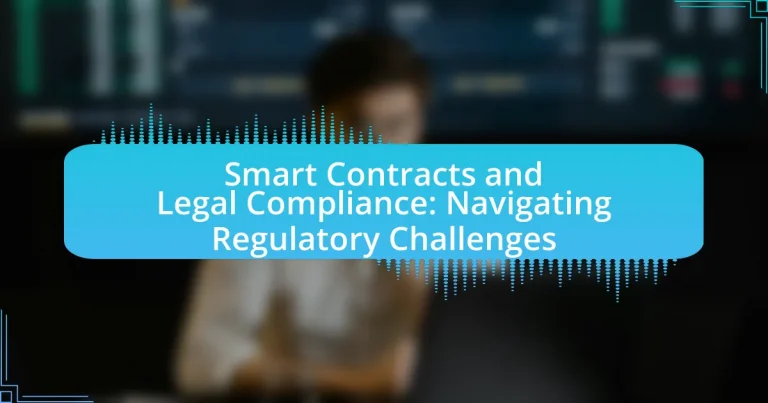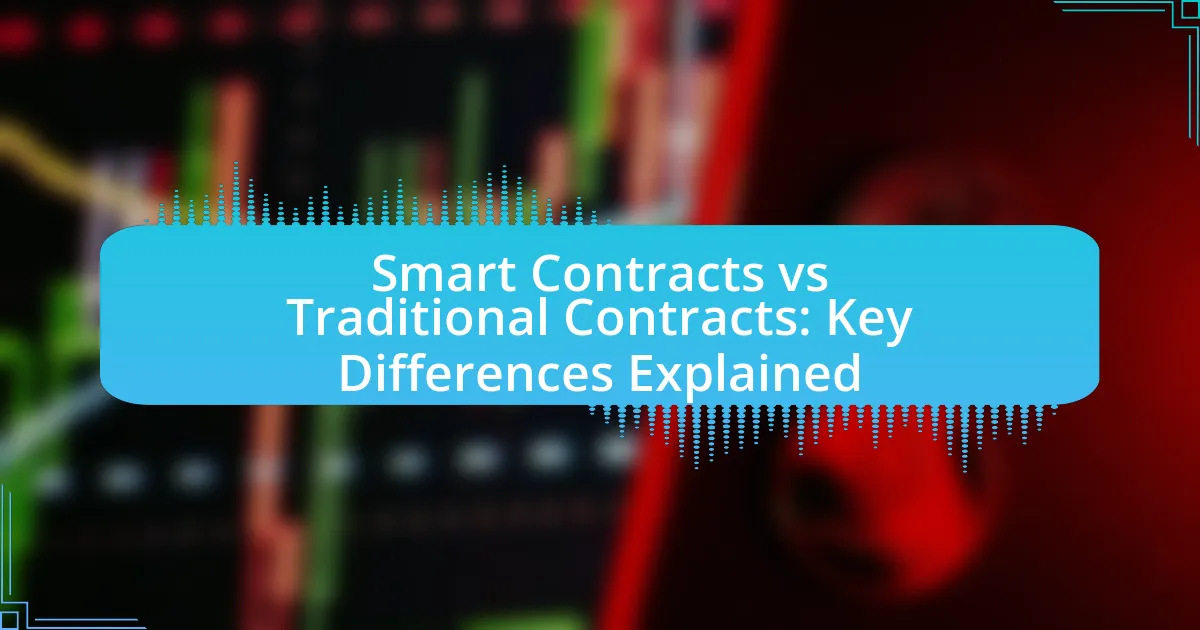Smart contracts are self-executing agreements with terms encoded on blockchain technology, playing a crucial role in legal compliance by automating and enforcing contractual obligations. This article explores how smart contracts function within legal frameworks, their key features that ensure compliance, and the potential legal risks associated with their use. It also examines the regulatory challenges faced by smart contracts across different jurisdictions, the implications of non-compliance, and best practices for businesses to navigate these complexities. Additionally, the article highlights the importance of legal advisors and compliance management tools in ensuring adherence to regulations, as well as future trends that may shape the landscape of smart contracts and legal compliance.
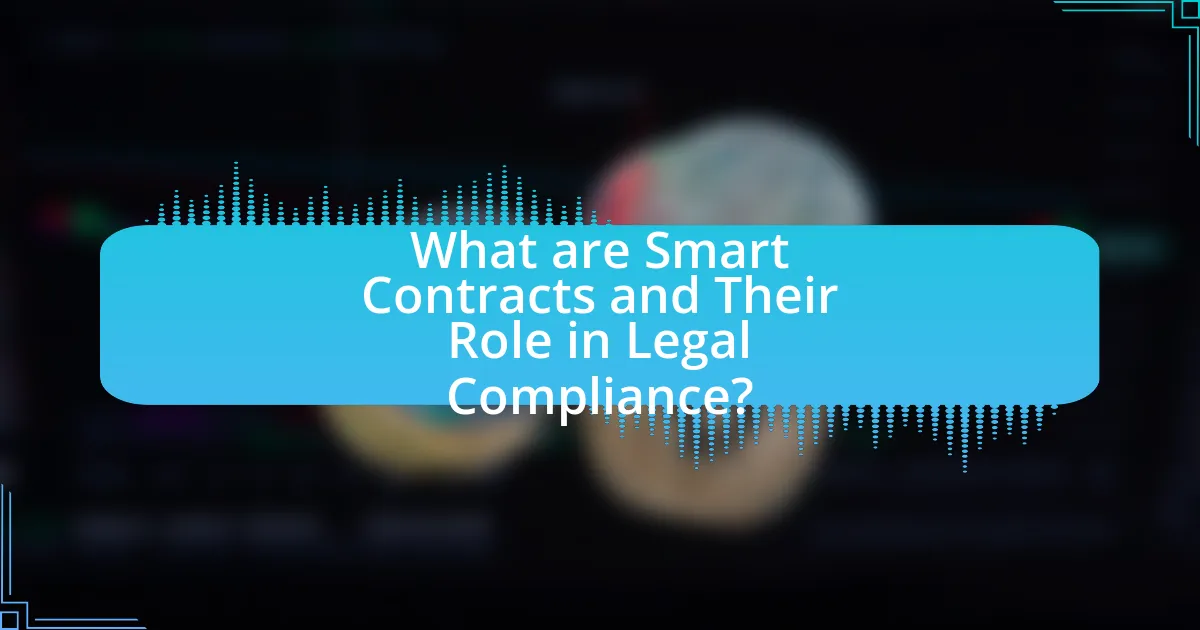
What are Smart Contracts and Their Role in Legal Compliance?
Smart contracts are self-executing contracts with the terms of the agreement directly written into code, operating on blockchain technology. Their role in legal compliance involves automating and enforcing contractual obligations, thereby reducing the risk of human error and increasing transparency. For instance, smart contracts can automatically execute transactions when predefined conditions are met, ensuring compliance with regulatory requirements without the need for intermediaries. This capability is supported by the immutable nature of blockchain, which provides a verifiable record of all transactions, enhancing accountability and trust in legal processes.
How do Smart Contracts function within legal frameworks?
Smart contracts function within legal frameworks by automating and enforcing contractual agreements through code, which operates on blockchain technology. These digital contracts execute predefined actions when specific conditions are met, thereby reducing the need for intermediaries and enhancing efficiency. Legal recognition of smart contracts varies by jurisdiction; for instance, the Uniform Electronic Transactions Act in the United States acknowledges electronic signatures and records, which can include smart contracts, as legally binding. Additionally, jurisdictions like Switzerland have established legal frameworks that explicitly recognize the validity of smart contracts, providing clarity and security for parties involved.
What are the key features of Smart Contracts that ensure compliance?
The key features of Smart Contracts that ensure compliance include automation, transparency, and immutability. Automation allows for the execution of contract terms without the need for intermediaries, reducing the risk of human error and ensuring that actions are taken as specified. Transparency provides all parties with access to the contract’s code and terms, fostering trust and enabling verification of compliance with regulations. Immutability ensures that once a Smart Contract is deployed, its terms cannot be altered, which protects against fraud and maintains the integrity of the agreement. These features collectively enhance adherence to legal standards and regulatory requirements in various jurisdictions.
How do Smart Contracts automate legal processes?
Smart contracts automate legal processes by executing predefined contractual terms automatically when specific conditions are met. This automation reduces the need for intermediaries, minimizes human error, and enhances efficiency in contract execution. For instance, in real estate transactions, smart contracts can automatically transfer ownership once payment is confirmed, streamlining the process and ensuring compliance with legal requirements. The use of blockchain technology ensures that these contracts are tamper-proof and transparent, providing a reliable record of all transactions.
Why is Legal Compliance Important for Smart Contracts?
Legal compliance is crucial for smart contracts because it ensures that these automated agreements adhere to existing laws and regulations, thereby reducing legal risks. Smart contracts operate on blockchain technology, which can create enforceable agreements without intermediaries; however, if they do not comply with legal standards, they may be deemed invalid or unenforceable in a court of law. For instance, jurisdictions like the European Union have specific regulations regarding data protection and consumer rights that must be integrated into smart contract design to avoid penalties. Compliance not only protects parties involved but also fosters trust and encourages broader adoption of smart contracts in various industries.
What are the potential legal risks associated with Smart Contracts?
The potential legal risks associated with smart contracts include issues related to enforceability, regulatory compliance, and liability. Enforceability can be challenged if the smart contract lacks clear terms or if the parties involved did not have the legal capacity to enter into the agreement. Regulatory compliance risks arise from the evolving legal landscape surrounding blockchain technology, where jurisdictions may impose different rules that could affect the validity of smart contracts. Liability concerns may emerge if a smart contract executes incorrectly due to coding errors or unforeseen circumstances, leading to disputes over damages or losses. These risks highlight the importance of legal review and adherence to applicable laws when implementing smart contracts.
How can Smart Contracts mitigate compliance risks?
Smart contracts can mitigate compliance risks by automating and enforcing regulatory requirements through self-executing code. This automation reduces human error and ensures that all parties adhere to the agreed-upon terms, as the contract executes actions only when predefined conditions are met. For instance, smart contracts can automatically verify compliance with financial regulations by checking transaction data against regulatory standards in real-time, thereby minimizing the risk of non-compliance. Additionally, the transparency and immutability of blockchain technology, which underpins smart contracts, provide an auditable trail of all transactions, making it easier for organizations to demonstrate compliance during audits.
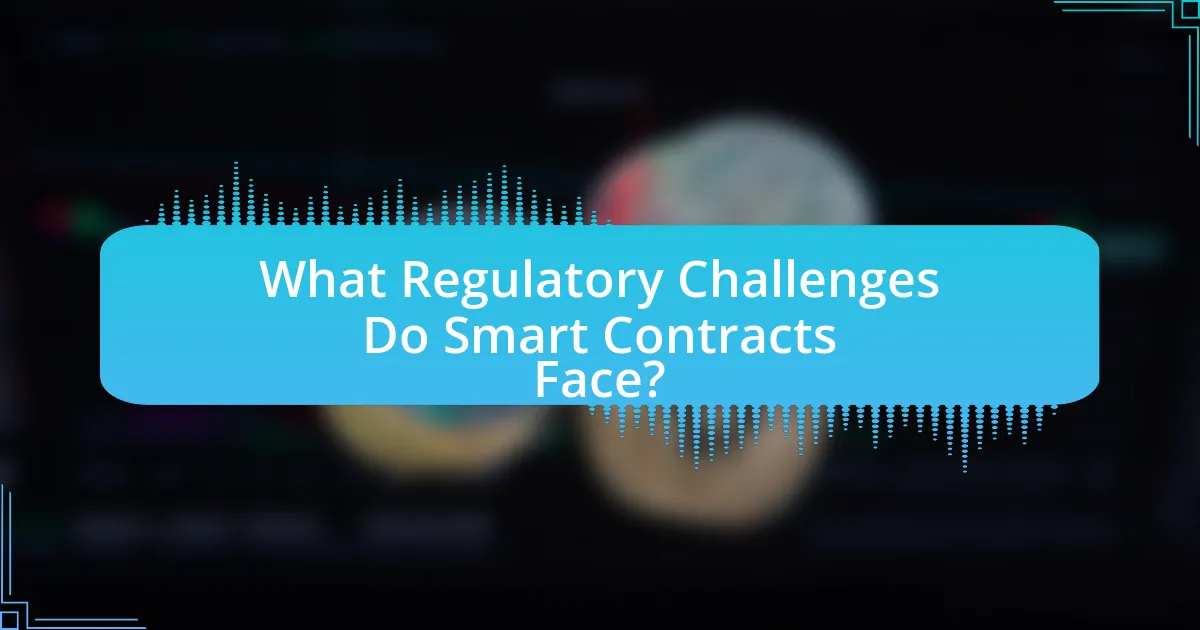
What Regulatory Challenges Do Smart Contracts Face?
Smart contracts face significant regulatory challenges primarily due to their decentralized nature and the lack of established legal frameworks governing them. These challenges include issues related to jurisdiction, enforceability, and compliance with existing laws such as contract law, securities regulations, and anti-money laundering requirements. For instance, the ambiguity surrounding which jurisdiction’s laws apply can complicate dispute resolution, as smart contracts often operate across borders. Additionally, the inability to modify smart contracts post-deployment raises concerns about compliance with regulatory changes, as seen in cases where evolving financial regulations may render certain contract terms illegal.
How do different jurisdictions regulate Smart Contracts?
Different jurisdictions regulate smart contracts through a combination of existing contract law, specific blockchain regulations, and emerging legal frameworks. For instance, in the United States, smart contracts are generally recognized under the Uniform Electronic Transactions Act (UETA) and the Electronic Signatures in Global and National Commerce Act (ESIGN), which affirm the legal validity of electronic signatures and records. In contrast, the European Union is developing a regulatory framework that includes the Digital Services Act and the proposed Regulation on Markets in Crypto-Assets (MiCA), which aims to provide clarity on the legal status of smart contracts and their enforceability. Additionally, countries like Switzerland have established a legal framework that explicitly recognizes smart contracts as enforceable agreements under their Code of Obligations. These regulatory approaches demonstrate that while there is no uniform global standard, jurisdictions are increasingly adapting their legal systems to accommodate the unique characteristics of smart contracts.
What are the variations in Smart Contract regulations across countries?
Smart Contract regulations vary significantly across countries, reflecting differing legal frameworks and approaches to technology. For instance, in the United States, regulations are primarily determined at the state level, with some states like Wyoming actively promoting blockchain and smart contract use through favorable legislation. In contrast, countries like China have imposed strict regulations, limiting the use of blockchain technology and smart contracts in favor of state-controlled alternatives. The European Union is working towards a unified regulatory framework, as seen in the proposed Markets in Crypto-Assets (MiCA) regulation, which aims to provide clarity and consumer protection while fostering innovation. These variations highlight the diverse regulatory landscapes that impact the development and implementation of smart contracts globally.
How do local laws impact the enforceability of Smart Contracts?
Local laws significantly impact the enforceability of smart contracts by determining their legal recognition and the conditions under which they can be executed. Jurisdictions vary in their acceptance of digital agreements, with some explicitly recognizing smart contracts under existing contract law, while others may not. For instance, the Uniform Electronic Transactions Act (UETA) in the United States validates electronic signatures and records, thereby supporting the enforceability of smart contracts. Conversely, in regions lacking such legal frameworks, smart contracts may face challenges in enforcement due to ambiguity in their legal status. This variability underscores the necessity for parties to understand local regulations to ensure that their smart contracts are legally binding and enforceable.
What are the implications of non-compliance for Smart Contracts?
Non-compliance with legal regulations can lead to significant implications for smart contracts, including legal invalidity, financial penalties, and reputational damage. When smart contracts fail to adhere to applicable laws, they may be deemed unenforceable in a court of law, resulting in parties being unable to seek legal recourse for breaches. Additionally, organizations may face fines or sanctions from regulatory bodies, as seen in cases where blockchain projects have been penalized for violating securities laws. Furthermore, non-compliance can erode trust among users and stakeholders, potentially leading to decreased adoption and investment in the technology.
What penalties can arise from failing to comply with regulations?
Failing to comply with regulations can result in various penalties, including fines, legal sanctions, and operational restrictions. Regulatory bodies impose financial penalties that can range from thousands to millions of dollars, depending on the severity of the violation. For instance, the Securities and Exchange Commission (SEC) has levied fines exceeding $1 billion in cases of non-compliance with securities laws. Additionally, organizations may face criminal charges, leading to imprisonment for responsible individuals, as seen in cases involving fraud or negligence. Non-compliance can also result in the suspension or revocation of licenses necessary for operation, severely impacting business continuity.
How can businesses prepare for potential legal challenges?
Businesses can prepare for potential legal challenges by implementing comprehensive risk management strategies that include regular legal audits, employee training on compliance, and establishing clear policies and procedures. Regular legal audits help identify vulnerabilities in contracts and operations, ensuring adherence to applicable laws and regulations. Employee training on compliance fosters a culture of awareness and accountability, reducing the likelihood of legal infractions. Additionally, clear policies and procedures provide a framework for decision-making and conflict resolution, which can mitigate risks associated with legal disputes. According to a study by the American Bar Association, organizations that proactively manage legal risks can reduce litigation costs by up to 30%.
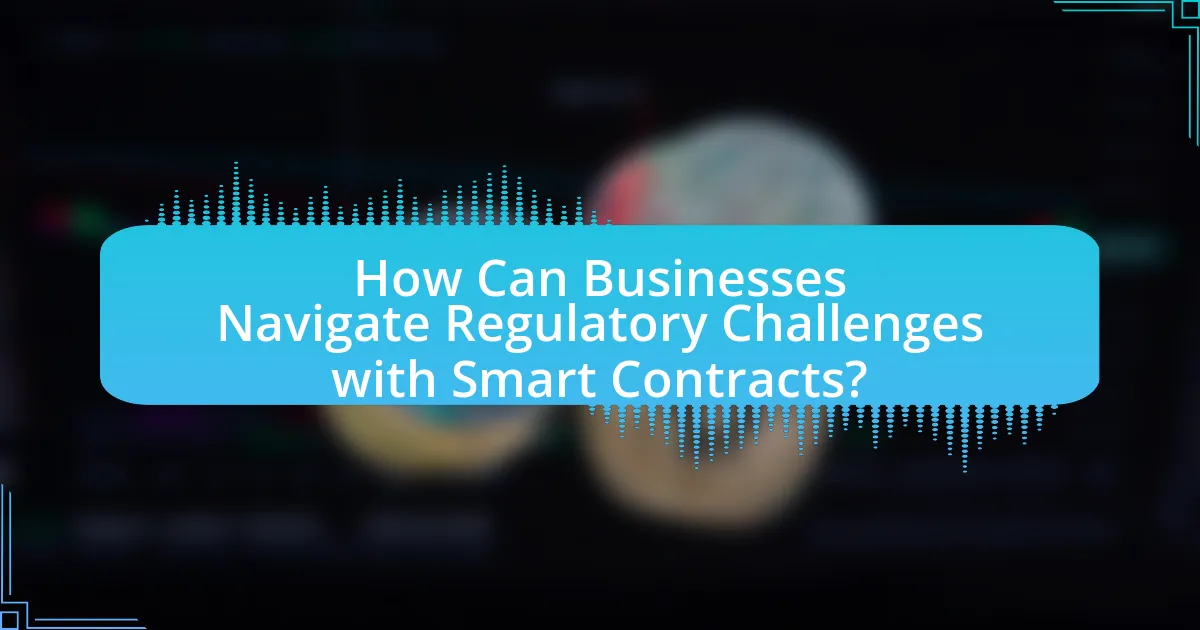
How Can Businesses Navigate Regulatory Challenges with Smart Contracts?
Businesses can navigate regulatory challenges with smart contracts by ensuring compliance through thorough legal review and integration of regulatory requirements into the contract’s code. This approach allows businesses to automate compliance checks and maintain transparency, which is crucial in regulated industries. For instance, incorporating jurisdiction-specific regulations directly into the smart contract can help ensure that all transactions adhere to local laws, thereby reducing the risk of legal disputes. Additionally, engaging legal experts during the development phase can provide insights into potential regulatory pitfalls, ensuring that the smart contracts are designed to meet all necessary legal standards.
What best practices should businesses follow for compliance?
Businesses should implement a comprehensive compliance program that includes regular risk assessments, employee training, and adherence to relevant regulations. Regular risk assessments help identify potential compliance gaps, while employee training ensures that all staff understand their responsibilities regarding compliance. Adhering to regulations such as the General Data Protection Regulation (GDPR) or the Sarbanes-Oxley Act is crucial for maintaining legal standards. According to a study by the Compliance and Ethics Institute, organizations with robust compliance programs experience 50% fewer compliance violations, demonstrating the effectiveness of these best practices.
How can businesses stay updated on regulatory changes affecting Smart Contracts?
Businesses can stay updated on regulatory changes affecting Smart Contracts by subscribing to legal and regulatory newsletters, attending industry conferences, and engaging with legal experts specializing in blockchain technology. These methods provide timely information on evolving regulations and compliance requirements. For instance, organizations like the International Association for Trusted Blockchain Applications (INATBA) regularly publish updates and host events that focus on regulatory developments in the blockchain space. Additionally, monitoring government websites and regulatory bodies, such as the U.S. Securities and Exchange Commission (SEC), can offer direct insights into new policies impacting Smart Contracts.
What role do legal advisors play in ensuring Smart Contract compliance?
Legal advisors play a crucial role in ensuring Smart Contract compliance by interpreting applicable laws and regulations to guide the development and execution of these contracts. They assess the legal implications of the Smart Contract’s terms, ensuring that they align with existing legal frameworks, such as contract law, data protection regulations, and industry-specific compliance requirements. For instance, legal advisors may review the code and functionality of a Smart Contract to identify potential legal risks and ensure that the contract adheres to jurisdictional requirements, thereby mitigating the risk of disputes or regulatory penalties. Their expertise is essential in navigating the complexities of blockchain technology and its intersection with traditional legal principles, ensuring that Smart Contracts are enforceable and compliant with relevant laws.
What tools and resources are available for ensuring compliance?
Tools and resources available for ensuring compliance in the context of smart contracts include regulatory compliance software, legal frameworks, and auditing tools. Regulatory compliance software, such as ComplyAdvantage and LogicGate, helps organizations automate compliance processes and monitor regulatory changes. Legal frameworks, including the Uniform Electronic Transactions Act (UETA) and the Electronic Signatures in Global and National Commerce Act (ESIGN), provide guidelines for the legal validity of smart contracts. Auditing tools, like Chainalysis and Blockseer, enable organizations to track transactions on blockchain networks, ensuring adherence to financial regulations. These resources collectively support organizations in navigating the complexities of legal compliance associated with smart contracts.
How can technology assist in monitoring compliance for Smart Contracts?
Technology can assist in monitoring compliance for Smart Contracts by utilizing blockchain’s immutable ledger and automated auditing tools. The decentralized nature of blockchain ensures that all transactions are recorded transparently and cannot be altered, which provides a reliable source of truth for compliance verification. Automated auditing tools can continuously analyze contract performance against regulatory requirements, flagging any discrepancies in real-time. For instance, platforms like OpenZeppelin provide security audits and compliance checks for Smart Contracts, ensuring they adhere to legal standards. This combination of transparency and automation enhances the ability to monitor compliance effectively and efficiently.
What are the benefits of using compliance management software?
Compliance management software enhances organizational efficiency by automating compliance processes, reducing the risk of non-compliance, and ensuring adherence to regulatory requirements. This software streamlines documentation, tracking, and reporting, which minimizes human error and saves time. According to a study by the Ponemon Institute, organizations using compliance management software can reduce compliance costs by up to 30%, demonstrating its financial benefits. Additionally, it provides real-time monitoring and alerts for regulatory changes, enabling businesses to adapt swiftly and maintain compliance, thereby protecting against potential legal penalties and reputational damage.
What are the future trends in Smart Contracts and legal compliance?
Future trends in smart contracts and legal compliance include increased integration with regulatory frameworks, enhanced interoperability, and the adoption of decentralized identity solutions. As governments and regulatory bodies recognize the potential of blockchain technology, they are likely to develop clearer guidelines that facilitate the use of smart contracts while ensuring compliance with existing laws. For instance, jurisdictions such as Switzerland and Singapore are already establishing legal frameworks that support smart contracts, which can serve as models for other regions. Additionally, the rise of interoperability standards will enable smart contracts to function across different blockchain platforms, enhancing their utility in various legal contexts. Furthermore, decentralized identity solutions are expected to play a crucial role in verifying identities and ensuring compliance, thereby reducing fraud and increasing trust in automated agreements. These trends indicate a shift towards a more regulated and standardized environment for smart contracts, aligning them with traditional legal practices.
How might emerging technologies impact Smart Contract regulations?
Emerging technologies, such as artificial intelligence, blockchain advancements, and decentralized finance, may significantly influence Smart Contract regulations by enhancing transparency, automating compliance, and enabling real-time monitoring. For instance, blockchain’s immutable ledger can provide verifiable audit trails, which regulators can use to ensure adherence to legal standards. Additionally, AI can facilitate the automatic execution of regulatory requirements within Smart Contracts, reducing human error and increasing efficiency. The integration of these technologies could lead to more adaptive regulatory frameworks that respond to the evolving landscape of digital transactions, as evidenced by ongoing discussions among regulatory bodies worldwide about the need for updated guidelines to accommodate technological advancements.
What should businesses anticipate regarding future legal frameworks?
Businesses should anticipate increased regulatory scrutiny and evolving legal standards surrounding smart contracts and digital transactions. As governments and regulatory bodies recognize the implications of blockchain technology, they are likely to implement more comprehensive frameworks to address issues such as consumer protection, data privacy, and financial compliance. For instance, the European Union’s proposed regulations on digital assets aim to create a unified legal framework that could significantly impact how businesses operate in the digital space. Additionally, the Financial Action Task Force (FATF) has issued guidelines that require businesses to comply with anti-money laundering (AML) and counter-terrorism financing (CTF) regulations, which will shape the legal landscape for smart contracts.
What practical steps can businesses take to ensure Smart Contract compliance?
Businesses can ensure Smart Contract compliance by implementing a comprehensive legal review process. This involves engaging legal experts to analyze the Smart Contract’s terms against applicable regulations, ensuring that all contractual obligations align with local and international laws. Additionally, businesses should incorporate audit mechanisms within the Smart Contract to facilitate transparency and traceability, which can help in demonstrating compliance during regulatory assessments. Regular training for employees on legal standards related to Smart Contracts is also essential, as it fosters a culture of compliance and awareness. Furthermore, utilizing established frameworks and standards, such as the International Organization for Standardization (ISO) guidelines on blockchain technology, can provide a structured approach to compliance.












